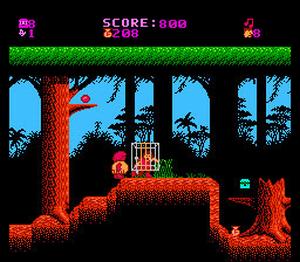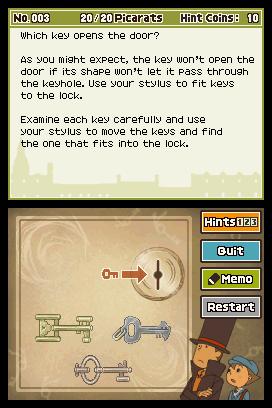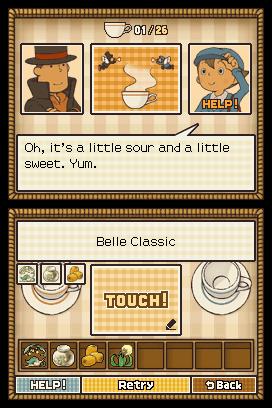This blog entry mostly concerns 19th century English literature.
By Video_Game_King 1 Comments
Fox's Peter Pan & The Pirates: The Revenge of Captain Hook
( Dear God, that is a long title.) In fact, the only game I can think of that has a longer title is that King Kong game, which is actually one word short of the record. For that reason, I shall only refer to it as Peter Pan & The Pirates, which is the title I found it under. You know, as part of that bet thing I mentioned the last time I reviewed an NES game? No? You don't remember that at all? And you're too lazy to sift through the first page of all my blogs? Leave. Now. *you leave* Now that he's gone, please enjoy this short review for a game you've never heard of.Oddly enough, while that part is nothing new, what is new is that you guys have a good idea what the game's about, so I'm not going to say much on the story. It's Peter Pan, so your goal is to rid Neverland of all the pirates. Seems a bit smart for somebody stuck at an age when most of us still thought cartoons were real, but unfortunately, that's about as smart as he gets; about half the pirates in the game use guns, while Peter Pan uses a crappy little knife. That's the most accurate way I can describe it; "crappy" because one stab isn't enough to kill anything, "little" because you have to stand close enough for your enemies to pistol whip you, and "knife" because Pan's weapon is knife-y in nature.

So if the game isn't about killing the enemies, it should be about finding the enemies so you can kill them, right? Again, not really, since the levels are linear, the enemies walk back and forth in the open, and very rarely are you unable to reach their location. Granted, it's hard to reach said location, given the game's crap jumping mechanics, but actually finding them is not a challenge whatsoever. Hell, some of them even manage to kill themselves, eliminating any need to reach them! So what's the purpose of this game, why does it exist?......I have no idea. Based on my research, it was based on a crappy, short-lived cartoon from around the time, but that just begs the question "Why did the cartoon exist?" That's a question I can't answer, but I can answer the very easy question of whether or not this game is good.
No, it's not. The game mechanics are clunky and there only nine levels of three varieties. Oh, and there are the unanswered questions it poses, like "Why does it exist" and "Why isn't Chris Hansen perpetually guarding the island?" On that note, I'll give this game the Lemonade and McDonald's Award for Excellence in Pedophilia. It would probably make sense to represent it with a picture of both, but instead, I've opted for this 100% real picture of Peter Pan Wikipedia uses for all Peter Pan related articles. Look at that. I'm surprised all the pedophiles of the world haven't died in plane crashes that results from flying straight on 'til morning.
Review Synopsis
- A game based around killing enemies where killing the enemies isn't fun or good. Amazing.
- Everything related to jumping is clunky and poorly put together.
- Why does this game exist?
I hereby declare that instead of posting "LOL", you shall post this video:
Professor Layton and the Diabolical Box
( Wait, I think this exact same thing may have happened before.) Oh, you don't know what I'm talking about? Well, let me elaborate. Back when I was playing Phantasy Star Collection for my 800 beaten games thing, I eventually had to pass through Phantasy Star III. If you'll recall, I found it to be a rough, generic game that did the Phantasy Star series no justice. So it should come as no surprise that my expectations were probably lowered, meaning my score for Phantasy Star IV may have been inflated a bit. And now we see Phantasy Star III Syndrome repeat itself with the new Professor Layton game. After suffering through Shin Megami Tensei: Devil Survivor, a turd so rough and hard that it managed to get stuck in my previously raped rectum, I went straight for the Diabolical Box, which excelled in everything where Devil Survivor failed. 
In fact, that was probably my first thought upon starting a new game; while the highest quality cinematics Atlus could create were simple anime cutouts slowly moving on a city background or whatever, Layton starts things off with something that looks and sounds (holy crap!) professional enough to be its own cartoon. Oh, and don't think the game is stingy with these cutscenes; you'll see them somewhat often, and on other occasions, voice work will accompany the regular text. However, most of the time, you're stuck with text scenes that could have been ripped from Fire Emblem, if Fire Emblem was a cartoony take on Sherlock Holmes. Again, it looks fantastic, and again, I feel I must say that the visuals in this game could comprise their own cartoon.
Hold on....something feels....off....Perhaps I should check my reviewing guide. *does so* Looks like I disobeyed the first rule: open with story, use such to transition into gameplay. OK, everyone, pretend that this is the opening paragraph. You take the role of an esteemed archaeological professor, travelling the world with a small child as he tries to solve the mystery of an enigmatic relic from long ago. Along the way, he'll have to put up with a slightly incompetent rival cop-guy, solve a few local mysteries, and ask people what they know of the Elysian Box. For some reason, though, every single one of those involves solving puzzles, often times ones that have no relevance to anything in the game. OK, so it manages to make a few of the puzzles fit into the storyline, especially near the end of the game, but I still found too many instances of characters "being reminded of puzzles" or "passing the time with a riddle" or other equally bullshit lines.
Wait, can somebody remind me why I'm insulting the puzzles? Because they didn't fit into the story? Really? You know, that seems very petty, especially since I spent a lot of my time actively searching for puzzles to complete. "Screw the story", I thought, "I haven't solved a puzzle in four entire minutes!" Then some random townie would throw a puzzle in my direction, and, depending on the puzzle, I'd either thank him for the slightly challenging brain teaser or jam a stylus into his eyes. The main paradox of this game is that while the puzzles are arguably the best/only part of this game, a lot of them push the limit on how much your brain can handle. Part of the problem tends to be ambiguous wording in some of the puzzles, yet the larger part of the problem is that these were puzzles probably designed to confuse Stephen Hawking.
The best example I could think of was a math puzzle involving three mayors. The premise is that there are three people running for mayor in a 40 person town, and you have to find out how many votes one needs to win with certainty. It sounded like a simple answer of 14, but Professor Layton lowered his hat in shame. Then I answered whatever's above a third of 37, only to get the same look. I kept checking my math and entering wrong answers until my score would stop lowering (oh, on that subject: why doesn't the score go down to zero? Can somebody tell me?), at which point I finally caved in and received a hint. It told me something I figured out 30 tries ago: discount the mayors from the voting. Not satisfied, I opened up another hint, which seemed to say the exact opposite of what Hint 1 was telling me. Frustrated beyond belief, I entered the random number of 20 and got the right answer, apparently. I was then presented with the logic behind such an answer, as if the game was telling me, "We know you looked it up on GameFAQs, so this is how you do it, dumbass."
That's another problem I have with the game: how damn condescending it can be. As I've already mentioned, failure warrants insulting poses from the two protagonists, but what I haven't mentioned is that you're given a small hint/message that always amounts to "Did you forget to turn your brain on?" Yet for all the bad things I have to say about the puzzles, I can't be too mad at them, for several reasons. First, (almost) all of them have perfectly legitimate answers, some of them with multiple ways to solve them. But whichever route you take to the right answer, they all end with the satisfying feeling that makes you think you're smart for knowing how to solve a Tower of Hanoi puzzle. And even if you don't solve it on your first go, the game gives you a very important tool to help you get there: the memo. Having trouble solving a particular puzzle? Of course you are, you're playing Professor Layton! Just fire up the memo fuction, and you're now able to scribble some notes on the screen! A good feature, granted, but it needs a bit of work. For example, if you want to erase your notes, you're gonna have to erase them all. There's no choice, no button to activate an eraser; you either have to press the clear button or purposefully fail the puzzle. You were gonna fail it anyway, but my point is that while your progress in the puzzle carries over from failure to failure, your notes don't. Thanks a lot, Layton; why not just give me a harder, completely different puzzle while you're at it?

Review Synopsis
- They've somehow found a way to make Sherlock Holmes more awesome.
- The puzzles range from fun, slightly challenging, and rewarding...
- ...to frustrating and illogical